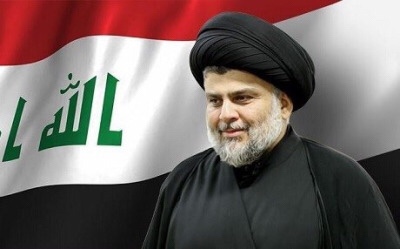 Muqtada al-Sadr and me: US foreign policy goals and Iraq’s future
Muqtada al-Sadr and me: US foreign policy goals and Iraq’s futureMichael Flanagan
Special to Al Arabiya English
Saturday, 7 July 2018
In today’s final instalment of “Muqtada and me,” I would like to uncover US attitudes about religion, nationalism and ethnicity in the Middle East and how these attitudes hamper our success in pursuing our regional foreign policy goals and then offer a little advice to Sadr.
Even though the White House is the decision-maker in most all foreign policy decisions, its input comes from various sources. Where there is no conflict likely (e.g. European issues), the State Department’s considerable resources tend to dominate the discussions at the White House. In places where military action is a real possibility, the State Department’s offerings are marginalized – however, much they could be helpful.
This is a problem because in the Middle East, the US military usually has not only the final say, but the only say. The Middle East is seen as an action arena which may require the deployment of forces, a mission statement and possibly troop action.
When proposing these often life and death decisions, the military acts on its own information almost exclusively. Other information, especially when it diverges from its own opinions, is rejected or marginalized by the military. They simply don’t play well with others. This is borne both of a devout belief that their facts are unassailable and that they are the experienced, “smart” guys in the room.
The military has rigid opinions of what the people in the Mideast are, want, wish to be and why they do what they do. And, consequently, the military has an unyielding opinion of what the response must be. Sadly, the military is usually more wrong than right.
Basic assumptions
This is so not because they are ill-informed or ignorant. No, it is so because they cram all information that they collect into neat boxes or basic assumptions created decades ago as if the peoples involved (the US included) haven’t changed at all and, more critically, that the assumptions were perfect in the first place. They weren’t and we all have changed.
These base assumptions were also made in an environment embracing the non-fact that “they think like we think.” These assumptions very poorly serve to predict and understand Arabs, Persians, Turks, Egyptians, Kurds, Sunni, Shi’a, Jews, Christians, Assyrians, Turkomen, Zoroastrians, Baathists, Sadrists, and so, so many other divisions and the differences between them. However imperfect they may be, these rigid assumptions allow for permanency in relationships.
The military decision-makers like permanency in their relationships. For example, the military considers: the Kurds as a close an ally as any we have ever had and that they are a permanent one; that all Arabs crave living in a democracy like the United States; Sadrist terrorists and those that deal with them are terrorists too and always will be; and, that all Iraqis in government are agents of Iran and Iran is permanently irredeemably bad – just to name a few.
The military will continue to have a dominant view in the relations we make in the Middle East even though that their view is flawed at best and simply wrong at worst. The military will continue to play a dominant role in US relations with the Middle East – for better or worse. So if Iraq, under a Sadrist government, wants to formulate good relations with the United States, they would do well to take several steps in the near future – steps of which the military will approve.
First, make an outreach to the United States in a formal and warm way. There is nothing that Americans like more than a “reformed” terrorist. David Ben-Gurion and Menachem Begin were Prime Ministers of Israel and also were closely involved in the 1947 bombing of the King David Hotel which killed 91 and injured another 47 British soldiers barracked there. We forgave and forgot (as did the British). In time, we will again.
Promote pan-Arab solidarity
Second, promote pan-Arab alliances and solidarity. The current US foreign policy views the old dominant players in the Middle East (Turkey, Persia and Egypt) with great trepidation. US policy advisors believe that these old players have greater designs – including territorial designs – on parts of the Middle East. There is a manifest out-reach by the Trump Administration to the Arabs as a people in their nation-states to check these designs. This is a great opportunity to gain success at home and in the West.
Third, demonstrate religious toleration on an epic scale – not just with the Sunni Muslims but with the Christians, Jews and other minorities that once lived in Iraq and could and should again. Strongly invite them back to resume their Iraqi heritage, love for their homeland and to re-enrich Iraq at-large.
Last, promote Iraqi nationalism. Guide all the factions in the only successful polyglot country in the Middle East to once again sit at the same table and to put all of their allegiances below that of love of country. Promote anti-corruption measures as an act of a national imperative. Guide the development of economic diversity as a necessity of Iraqi strength opposing its neighbors. Last (dare I say it), work to make Iraq great again.
Last Update: Saturday, 7 July 2018 KSA 14:10 - GMT 11:10
No comments:
Post a Comment